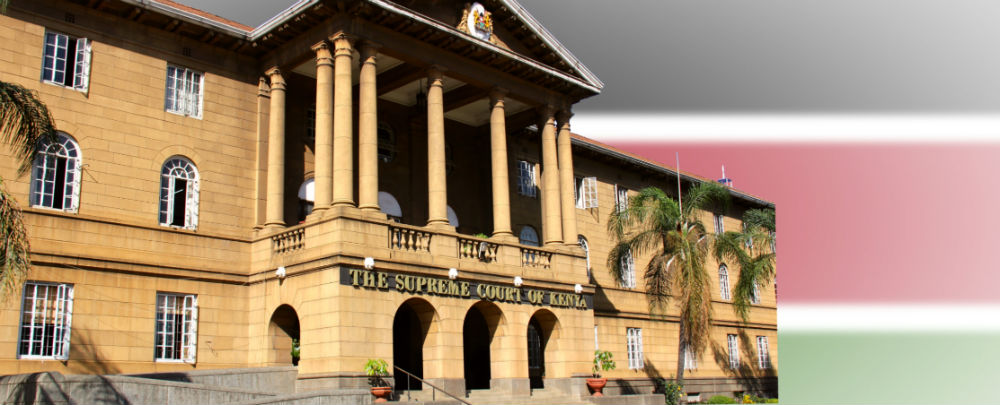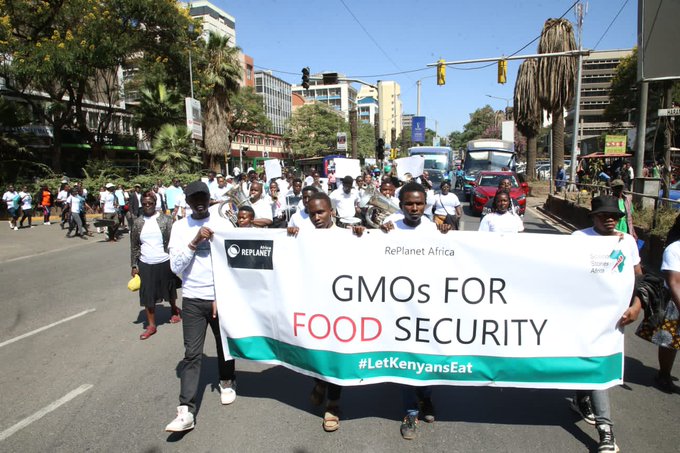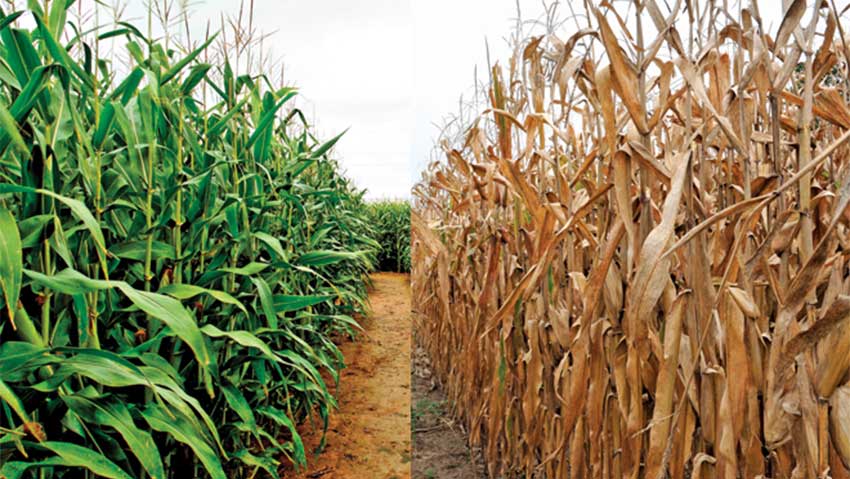Genetically modified organisms.
Mention those three words to young Kenyans and see how opinions will be divided.
This is because Kenya has had some of the most vocal anti-genetically modified organisms (GMOs) activists for decades, and 11 years ago, they felt their voices had been heard when the government banned GMO imports.
Kenya’s younger people, who account for about 75 percent of the population, have taken to social media platforms to make known their thoughts about GMOs.
They went silent because they had won, but late last year, they were awakened when the government lifted the ban to allow the importation and cultivation of GM crops.

They then went to court and got an order stopping the government from proceeding with its plan.
The courts are yet to deliver a judgment.
“I have grown up eating organic food. Are GMO foods good? Maybe yes or no, but if they can end food shortages in Kenya, then I guess they are good.”
Still, Kenyans cannot stop talking about GMOs — with disinformation and misinformation on the one hand and facts on the other flowing almost equally.
A 2022 survey by GeoPoll found that out of the 91 percent of Kenyans who had heard about the government’s move to lift the ban, 51 percent agreed at varying levels with the decision, while 21 percent disagreed.

Earlier this year, a group of Kenyan students and young pro-GMO activists marched through the streets of Nairobi, arguing that genetically modified seed varieties will lead to higher yields and improve food security.
The discussion around GMOs in Kenya is still very controversial because it is heavily swamped with misinformation.
Kenya’s younger people, who account for about 75 percent of the population, have taken to social media platforms to make known their thoughts about GMOs.
They argue that they are most likely to be affected by such decisions, so they must speak out.

A quick search on Tik Tok reveals a user @fakewokewithjustine who had a hilarious take on the ban that had been imposed 11 years ago: “The ban came after a study in France linked GMO foods to cancer. The president was like, GMO foods or plants that have gotten a BBL (Brazilian butt lift) have no place in your plate,” she says.
This study linking GM maize to cancer was discredited due to weak evidence and retracted from the journal that had published it.
Contrary to the belief that GMOs can cause cancer, there has been no evidence anywhere in the world linking them to cancer.
The claims of health risks from consuming GMO foods, which have been the main reason cited by anti-GMO lobby groups, are unfounded.
An Alliance for Science study found that 40 percent of media coverage by volume in Kenya promotes negative misinformation about GMOs.
The discussion around GMOs in Kenya is still very controversial because it is heavily swamped with misinformation.
Most of the misinformation is perpetuated not only by political leaders and anti-GMO campaign groups but also by the media in two capacities: Actively as a disseminator of unfounded claims on the adverse effects of GMOs and passively by not challenging the untrue claims allegations made by their sources.
A study conducted by the Alliance for Science between October 2022 and January 2023 found that 40 percent of media coverage by volume in Kenya promotes negative misinformation about GMOs, and only three percent of articles contained pro-GMO misinformation.
Kenya is facing an unprecedented deterioration in food security, and over 5.4 million people experienced acute food insecurity between March and June this year.
The misinformation has deeply impacted Kenyan youth’s understanding of and beliefs about GMOs.
Another TikToker, @vokeswakiambu, had this opinion on GMOs: “They’re good; they grow faster. I understand they can solve Kenya’s food security, which is correct. But my question is…will the GMOs reduce or increase the mortality rate… ?”
According to a report by Integrated Food Security Phase Classification (IPC), Kenya is facing an unprecedented deterioration in the food security situation, and over 5.4 million people experienced acute food insecurity between March and June this year.
Genetically modified crops, however, are a viable solution to the food insecurity situation in the country.
This is because genetic engineering can improve crop yield.

Other than that, genetically modified crops can be resilient to drought or resistant to pests.
For instance, the disease-resistant cassava Kenya approved for cultivation about two years ago is unaffected by the destructive cassava brown streak disease (CBSD).

“Traditionally, Kenyans have been used to organic foods,” says Fanuel Dawkins.
According to the 25-year-old International Relations graduate, the end always justifies the means.
“I have grown up eating organic food. Are GMO foods good? Maybe yes or no, but if they can end food shortages in Kenya, then I guess they are good,” he says.

Bill ‘OJ’ Ojwang’ also shares the same sentiments on adopting improved seed varieties in Kenya.
“The world is moving towards technology-assisted living. Everything we have always done can somehow be better by some technology somewhere. I see nothing wrong with adopting technology in how we grow and process our food as long as it’s safe.”
Asked whether he would consume GM foods, the 30-year-old community health educator and promoter said, “Yes, I would, not by choice but by circumstance. Food production is costly because farmers growing organic food spend more, especially on fertilizers and pesticides, and the yield is often low. So, their prices are high because the inputs are costly. With the increasing cost of living, GM foods may be the solution.”
“I do not mind consuming GM foods, especially because the alternatives are too costly. However, the problem with our country is that the law around GMOs is so manipulable.”
Besides misinformation, inadequate information also affects how Kenyan youth perceive GM crops.
While admitting to having scanty information on GMOs, Nairobi-based journalist Mwangi Maina still says that GM foods should be banned because they are not natural — even as scientific evidence proves otherwise, considering that GM foods are also grown in a natural environment.

For human rights lawyer Mwihaki Ng’ang’a, her hesitation around genetically modified food concerns regulation.
“I do not mind consuming GM foods, especially because the alternatives are too costly. However, the problem with our country is that the law around GMOs is so manipulable,” she said.
“Article 43(d) of the 2010 Constitution provides the right to be free from hunger and to have adequate food of acceptable quality. I speculate that companies will misuse the law if allowed, and we will end up with poor quality GM products in the country.”
She added that it is sometimes hard to distinguish between organic and GM foods, leaving one with no alternative but to pick what they can find.
“In some countries, GMO foods are sold in grocery shops, and people buy and eat, and they are fine. We should stop exaggerating.”
In Kenya, the National Biosafety Authority is the body mandated with exercising general supervision and control over the transfer, handling, and use of genetically modified organisms to ensure the safety of human and animal health and the provision of an adequate level of protection of the environment.
Some of its functions include advising the government on legislative and other measures relating to the safe development, transfer, handling, and use of genetically modified organisms and promoting awareness and education among the general public on matters about biosafety.

According to Fredrick Torah, a Chinese language translator and a tutor, the hesitation around GMOs is exaggerated.
“To be honest, I don’t understand what all this drama around GMOs is about,” Torah said.
“Who do you know who has eaten GM foods and died? Like me, you’ve been abroad; we ate things there that we didn’t even know where they came from, and none of us came back sick.
“In some countries, GMO foods are sold in grocery shops, and people buy and eat, and they are fine. We should stop exaggerating. If it were bad, those countries would not allow it.”
We have consumed improved varieties of certain crops for ages without any adverse side effects.
Other African countries have approved the growing and consumption of genetically modified crops and animal feeds.
South Africa is among the world’s top 10 countries planting genetically modified crops. Others are Sudan, Burkina Faso, and Egypt.
As Fredrick says, the case against GM foods in Kenya is exaggerated because, other than no proven case of GMO-related illness, we have consumed improved varieties of certain crops for ages without any adverse side effects.
___________________________________________________________________________________________
Gloriah Amondi is a Kenya-based multilingual human rights lawyer, Mandarin teacher, and writer contributing to The Nation’s weekend editions. Her works have been published in journals such as Kalahari Review, Ibua Literary Journal, Lolwe Literary Magazine, and Dooney’s Café.
